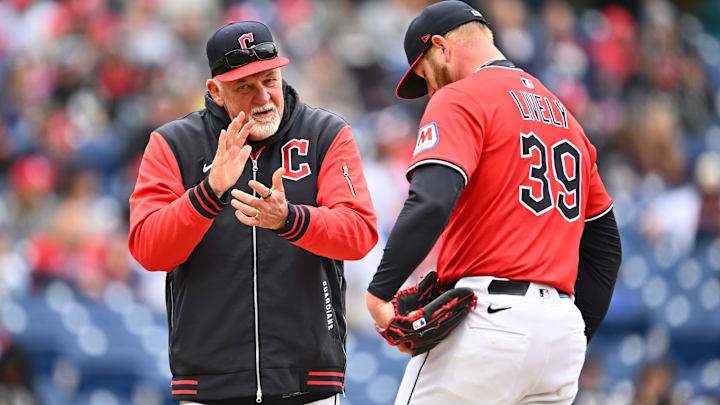In the world of Major League Baseball, where the spotlight often gravitates towards star players and high profile managers, the quiet, consistent influence of pitching coaches can sometimes be overlooked.
Yet, for the Cleveland Guardians, one name stands out as an indispensable pillar of their sustained success: Carl Willis. As the current pitching coach for one of the most consistent pitching staffs in MLB, Willis has carved out a legacy that extends far beyond the confines of the Guardians' dugout, prompting a fascinating question: could he be the first pitching coach to earn a coveted plaque in Cooperstown?
Carl Willis: The Unsung Architect of Pitching Excellence and a Potential Hall of Fame Pioneer
Willis's impact on the game stems from a profound understanding of the pitcher's psyche, honed during his own nine year career as an MLB hurler with the Tigers, Reds, Twins, and White Sox from 1984 to 1995; a journey that included a World Series title with Minnesota in 1991.
This firsthand experience allows him to connect with his staff on a deeper level.
He possesses a rare intuition, knowing when to trust his pitchers to navigate a jam and when to make a critical mound visit. Crucially, Willis doesn't impose a rigid system or attempt to overhaul a pitcher's mechanics. Instead, he empowers them, focusing on elevating their existing strengths and fostering a belief in their own abilities. This philosophy has cultivated an environment of trust and confidence that has become a hallmark of the Guardians' pitching staff.
The true measure of a pitching coach's influence isn't just in current team success; it's in the lasting impact on individual careers. And here, Carl Willis's resume is nothing short of extraordinary.
What makes working with Carl Willis so special? #GuardsBall
— Carlos Baerga Show (@BaergaShow) May 27, 2025
"That's probably the most important skillset a coach can have especially nowadays..."
- Corey Kluber pic.twitter.com/uRu6cpiecZ
While pitching coaches traditionally haven't been enshrined in the Hall of Fame, their work undoubtedly is. A compelling example is the recent induction of CC Sabathia, a first ballot Hall of Famer who unequivocally credited Willis (his first pitching coach in professional baseball) with playing the most significant role in his ascent to Cooperstown.
In 2007, under Willis's guidance, Sabathia posted a dominant 19 7 record and a 3.21 ERA in 34 starts and 241.0 innings for an Indians team that made it to Game 7 of the American League Championship Series
This isn't an isolated incident.
Willis's remarkable track record includes coaching an astonishing five Cy Young Award winners, a testament to his unparalleled ability to cultivate and refine elite pitching talent.
Following Sabathia, Willis coached Cliff Lee, who cruised to AL Cy Young win on the back of an AL-leading 22 wins to go along with a 2.54 ERA.
In 2010, "King" Felix Hernandez was an easy choice for the award under Willis's tutelage, as Hernandez had an AL-best 2.27 ERA with six complete games for the Mariners. Rick Porcello also thrived under Willis, going 22-4 with a 3.15 ERA in 33 games for the 2016 Red Sox.
Willis’ latest Cy Young Award success came with Shane Bieber’s dominating performance in the shortened 2020 season. In 12 starts with Cleveland that year, Bieber was 8-1 with a razor thin 1.63 ERA and 122 strikeouts in only 77 1/3 innings of work.
Shane Bieber is your 2020 American League Cy Young Award winner, and there was never a doubt.#OurTribe pic.twitter.com/uSrksMhM39
— Cleveland Guardians (@CleGuardians) November 11, 2020
Beyond individual accolades, Willis's influence resonates throughout the league. His methods and the success of his proteges have undoubtedly impacted how other organizations approach pitching development. He embodies the ideal modern pitching coach: a blend of technical expertise, psychological insight, and unwavering dedication to the growth of his pitchers.
The question of whether Carl Willis could be the first pitching coach inducted into the MLB Hall of Fame is a compelling one.
The Hall of Fame has historically focused on players, managers, and executives. However, as the game evolves and the critical role of specialized coaching becomes increasingly apparent, the criteria for recognition may also expand.
Willis's singular achievements his consistent production of elite pitching staffs, his profound impact on multiple Hall of Fame and Cy Young winning pitchers, and his quiet but undeniable influence on the sport present a powerful case.
While the precedent for pitching coaches in the Hall of Fame is non-existent, Carl Willis's sustained excellence and the undeniable imprint he has left on the careers of numerous star pitchers make him a truly unique candidate. His legacy is not just in the wins and losses of the Cleveland Guardians, but in the enduring success of the pitchers he has guided.
Perhaps, in due time, the Hall of Fame will recognize that the architectural genius behind so many brilliant careers deserves a place among baseball's immortals, making Carl Willis a pioneering and thoroughly deserving inductee.
